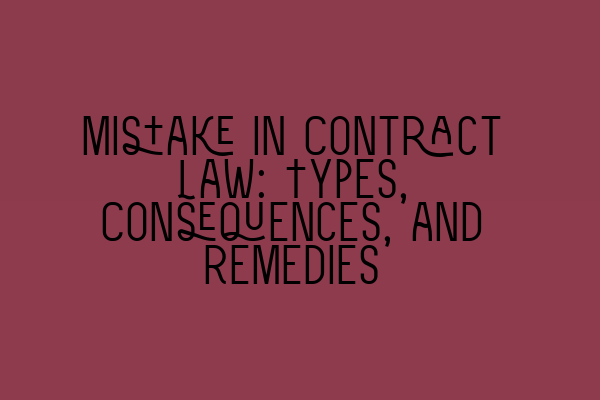Mistake in Contract Law: Types, Consequences, and Remedies
Contracts play a crucial role in legal transactions, governing the relationships and obligations between parties. However, mistakes can occasionally occur during the formation of a contract, leading to potential disputes and legal complexities. In this article, we will explore the different types of mistakes in contract law, their consequences, and the available remedies for parties affected by such mistakes.
The Types of Mistakes in Contract Law
Before delving into the consequences and remedies of mistakes, it is important to understand the various types of mistakes that can arise in contract law.
1. Common Mistakes
Common mistakes occur when both parties share the same mistaken belief about a fundamental aspect of the contract. This can include mistaken assumptions about the subject matter, terms, or conditions of the contract. Common mistakes can invalidate the contract, as the parties’ intentions do not align.
2. Mutual Mistakes
Mutual mistakes, also known as bilateral mistakes, occur when both parties are mistaken about a key element of the contract. These mistakes can range from incorrect information about the subject matter to misunderstandings about the terms or conditions. In cases of mutual mistakes, the contract may be void, as there is no true agreement between the parties.
3. Unilateral Mistakes
Unilateral mistakes occur when one party is mistaken about a key element of the contract, while the other party is aware of the mistake. In such cases, the contract may still be enforceable, unless the non-mistaken party took advantage of the mistake or the mistaken party’s error was caused by the non-mistaken party’s misrepresentation or inexcusable behavior.
The Consequences of Mistakes in Contract Law
When mistakes occur in a contract, they can have significant consequences for the parties involved.
1. Voidable Contracts
In cases of common or mutual mistakes, where the parties’ intentions do not align, the contract may be voidable. This means that either party can choose to rescind or terminate the contract, rendering the obligations under the contract null and void. Rescission aims to put the parties back in their original positions before entering into the contract.
2. Unenforceable Contracts
If a contract contains a unilateral mistake, it may still be enforceable unless the non-mistaken party unfairly benefits from the mistake or caused the mistake through misrepresentation or misconduct. In such cases, the court may refuse to enforce the contract or provide remedies to rectify the unfair advantage gained.
3. Damages and Restitution
In some instances, parties affected by a mistake in a contract may be entitled to claim damages or restitution. Damages aim to compensate the injured party for any losses suffered due to the mistake, while restitution seeks to restore any benefits conferred by the mistaken contract. The specific remedy available will depend on the circumstances and nature of the mistake.
Remedies for Mistakes in Contract Law
When mistakes occur in contracts, parties have various remedies available to address the situation and seek fair resolutions.
1. Rescission
Rescission allows the parties to void the contract and return to their pre-contract positions. This remedy is commonly sought in cases of common or mutual mistakes, where the contract is deemed voidable. Rescission can help restore the parties’ rights and obligations to their original state before entering into the mistaken contract.
2. Rectification
Rectification aims to correct a mistake made in a contract by altering its terms to align with the parties’ original intentions. It requires the court’s intervention to amend the contract and bring it in line with what the parties truly intended. Rectification is typically sought when a written contract fails to accurately reflect the parties’ agreement due to a mistake.
3. Damages
If a party suffers financial losses due to a mistake in a contract, they may seek damages as a remedy. Damages are awarded to compensate for the losses incurred, usually in monetary terms. The amount of damages awarded will depend on the extent of the losses suffered and the impact of the mistake on the injured party.
4. Specific Performance
In certain cases, a party may seek the remedy of specific performance if the contract was unenforceable due to a unilateral mistake. Specific performance requires the breaching party to fulfill their contractual obligations as originally intended, rather than simply relying on monetary compensation.
It is crucial for parties affected by mistakes in contracts to seek legal advice and guidance from experienced solicitors to understand their rights, obligations, and available remedies. Legal professionals can provide valuable insights and representation throughout the process, ensuring fair resolutions and protecting the parties’ interests.
For more legal insights into case studies and legal practice, read our article Unveiling Real-Life Case Studies: Insights into Legal Practice and Decision-Making.
To learn about solicitor salaries and factors affecting income, explore our article Exploring Solicitor Salaries in the UK: Average Earnings and Factors Affecting Income.
To enhance client relationship management skills as a solicitor, check out our article Mastering Client Relationship Management: Skills for Solicitors to Enhance Trust and Loyalty.
For guidance in pursuing a law school education in the UK, read our article Pursuing a Law School Education in the UK: Choosing the Right Path for Your Future.
To understand the roadmap to becoming a solicitor and securing training contracts, refer to our article Securing Training Contracts: A Roadmap to Becoming a Solicitor.
